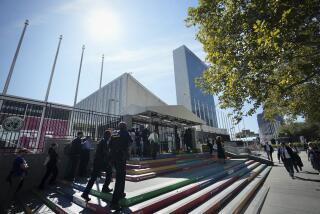U.N. Creates Deputy Leadership Post; Other Reforms Delayed
- Share via
UNITED NATIONS — The U.N. General Assembly on Friday created a powerful executive post for the world body that was described as crucial to American-backed reform plans for the organization.
Secretary-General Kofi Annan said approval of the job of deputy secretary-general, which will be the No. 2 job in the U.N., was “indispensable” to his efforts to bring greater administrative control and accountability to a diffuse organization often resistant to central authority.
Annan said he will move swiftly to appoint a deputy.
Although he has not revealed who is under consideration, officials here say the front-runner is Louise Frechette, a career civil servant and diplomat who was Canada’s U.N. ambassador from January 1992 until October 1994 and is now deputy defense minister in Ottawa.
Annan’s realignment of U.N. management, proposed in the summer, is intended to save as much as $200 million and counter perceptions that the world body is too bureaucratic and too slow to adapt to post-Cold War conditions.
Although the reforms have been criticized, even by U.N. insiders, as too modest, backers of the plan had to work hard to form a consensus for approval among the U.N.’s 185 members.
The resolution adopted Friday put off until March action on two other important reforms: the establishment of a new budget system intended to strengthen spending controls as well as providing an automatic phaseout date for most new U.N. programs, and the appointment of a top-level commission to study more far-reaching changes in the U.N. and its satellite agencies, like the World Health Organization.
Members of Annan’s staff said this week that they do not expect difficulty passing these measures in March, and in his Friday address to the General Assembly Annan emphasized that the reform process must continue.
Most opposition has come from developing nations suspicious of anything that they believe might detract from their power as the majority in the General Assembly, including concentration of authority in Annan and his staff.
Bill Richardson, the U.S. ambassador, praised Friday’s action. But there was no other good news here for Washington.
A Clinton administration drive to reduce the U.S. share of U.N. costs from 25% of the budget to 20% was rebuffed by other members. The initiative was doomed by Congress’ failure to enact a bill to begin paying more than $800 million in dues that the United States owes the U.N.
The bill, embodying a bargain struck by the administration with congressional leaders, would have paid $819 million in U.S. back dues over the next three years in return for reforms by the U.N. and a gradual reduction in the U.S. fees.
The bill foundered in the House of Representatives in November.
Although Congress is expected to take up the bill again in the spring, the November breakdown reinforced anti-U.S. feelings here. The huge U.S. arrears in dues is viewed here as evidence of Washington’s unreliability and arrogance.
“We were taken off the field and put in the stands by Congress,” said Richard Sklar, the U.S. delegate negotiating the dues reduction.
The best the U.S. can hope for now is a commitment by the U.N. to reopen talks on dues next year instead of in 2000, when the issue normally would come up.
Some developing countries also were fighting Washington’s efforts to cap the U.N. budget at $2.53 billion for two years, which would meet congressional mandates for a no-growth budget. Negotiations on the budget were expected to continue today.
More to Read
Sign up for Essential California
The most important California stories and recommendations in your inbox every morning.
You may occasionally receive promotional content from the Los Angeles Times.










